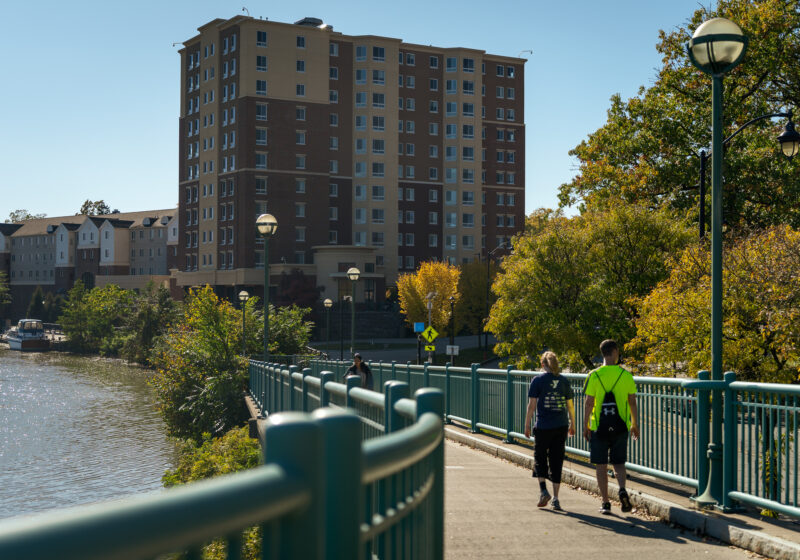Are you thinking about your housing options for next year? While 70% of UR undergraduates live in campus housing, about 30% choose to move off campus. You may be wondering if off-campus housing makes sense for you. If so, this article will illuminate the pros and cons of living off-campus, as well as offer the specifics on how to find an off-campus residence.
First, benefits:
- More space: The most obvious benefit of moving off campus is having more living space. According to current real estate listings, the average square footage of four-bedroom houses in the 19th Ward is 1,600 square feet (there is insufficient data on four-bedroom apartments in the area that aren’t University-owned). For context, the largest four-bedroom apartment at Riverview is 710 square feet.
- Potentially cheaper: Living off campus is generally cheaper than living on campus. The average rent for three to four-bedroom houses in the neighborhoods around campus generally falls between $1,500 and $2,400 per month, or about $500-600 a person. The most comparable residence halls to off-campus residences, Brooks Crossing and Riverview, are $1,102 prorated on a 12-month lease. Parking is generally included in an off-campus lease, saving you $500 in permit fees.
- No ResLife: One of the biggest perks of living off campus is the absence of ResLife and the bureaucracy and red tape associated with it. Your landlord will likely not care what bed and mattress you buy, nor will they care how you decorate your house.
- Universal kitchen access: This one is self-explanatory.
Neighborhoods: There are multiple neighborhoods near campus, but for the purposes of this article, I’ll be focusing on the two adjacent areas that also happen to be the most popular.
- 19th Ward
- Perhaps the most popular neighborhood for UR students, the 19th Ward offers a tremendous variety of rental options at reasonable prices. The neighborhood is bordered by West Avenue, Genesee Street, Scottsville Road, and the Erie Canal. It is also home to Brooks Crossing and is connected to the campus via a pedestrian bridge. It is almost entirely residential, and commercial activity is limited to a few convenience stores and delis. The neighborhood has historically been marred by crime and gang activity, but much of this has evaporated due to investments in safety by the University and the community association.
- Most of the rentals are in the southeastern portion of the neighborhood, located primarily on Spruce, Congress, and Brooks Avenues, with some on Genesee Street and Elmwood Avenue. The vast majority of these properties are single-family homes, with a scattering of small apartment complexes on Genesee Street and Brooks Avenue. Most of the homes were built between 1880 and 1940, and many have maintained their architectural heritage, featuring gumwood trim and hardwood floors. Rents typically hover around the $600/person range, making them far more affordable than both on-campus housing and similarly situated neighborhoods.
- Unfortunately, given their age and pricing, most of these homes lack modern amenities such as private bathrooms and central air conditioning. Additionally, on-street parking is almost entirely prohibited, making it difficult for those who have multiple cars to find parking.
- Strong/College Town
- As the name would suggest, this neighborhood is home to the University’s College Town Development as well as the University’s Medical Center. The eastern border cuts across Elmwood Avenue, Johnsarbor Drive, Gateway Road, and Westfall Road until it reaches the Erie Canal. Mount Hope Avenue runs through the neighborhood’s center. Given its proximity to campus and to local businesses, rents tend to command a premium when compared to those across the river (19th Ward, Plymouth Exchange, etc.). The housing stock consists primarily of pre-war and mid-century single-family homes but also includes The Lofts at Gold Street and Mount Hope Lofts, the former being exclusively student housing. Properties here often include modern features such as ensuite bathrooms, central air conditioning, and modern kitchens.
Agencies:
- Rocrooms:
- Offers fully furnished homes with utilities, internet, and monthly cleaning included.
- Locations are in neighborhoods like 19th Ward, Brooks Landing, and Genesee Valley Park.
- Pricing varies, typically ranging from $610 to $726 per month per person, depending on room size and amenities.
- Contact: (585) 672-4716
- Website: RocRooms
- Rochester Student Housing:
- Provides a variety of housing options, from studios to 4-bedroom apartments, with locations close to campus.
- Prices are competitive and aimed at offering affordable alternatives to on-campus housing. Many of the properties have been recently renovated, featuring hardwood floors, updated appliances, and other amenities.
- Contact: (585) 500-9525
- Website: https://rochstudenthousing.com/
- White Coat Village:
- Specializes in housing for medical, nursing, and graduate students, located just steps from the Medical Center.
- Homes offer ensuite bathrooms, shared common spaces, and laundry facilities, with modern kitchens and classic pre-war architecture.
- Rent starts around $695 per month, varying by room size and amenities.
- Contact: (585) 383-0287
- Website: White Coat Village
- places4students.com:
- A housing platform partnered with the University, offering listings for apartments and roommate matching.
- The university does not endorse specific properties, but students can use the platform to find a wide variety of rental options.
- Contact: (585) 275-1081
- Website: https://places4students.com/
- Rochester Smart Student Housing
- Similar to Rochester Student Housing in terms of properties available.
- Prices are very reasonable, and most of the properties have been recently renovated.
- Contact: 585-330-5256
- Website: https://www.rochestersmartstudenthousing.com/




